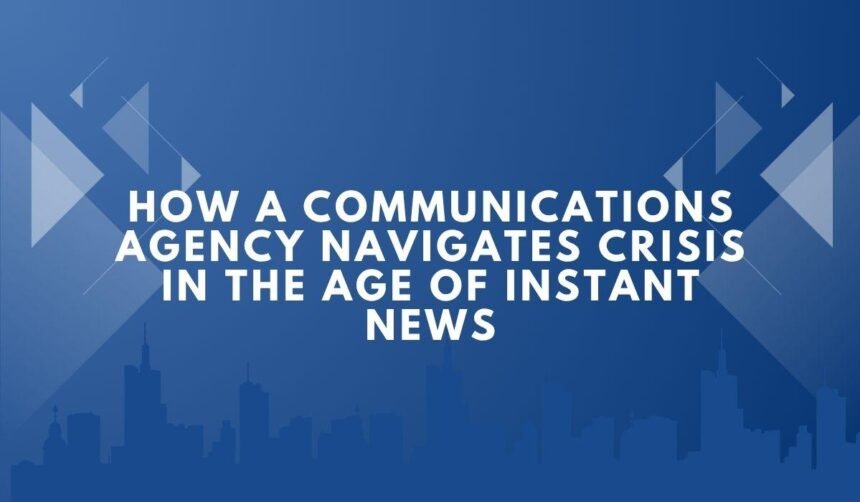In today’s world, news spreads faster than ever before. Social media, live streaming, and instant online updates mean that a small issue can quickly become a global headline. For businesses, this speed brings both opportunities and risks. A positive story can boost a brand in minutes, but a negative incident can damage its reputation just as quickly. This is why a communications agency plays a vital role in helping organizations manage a crisis effectively.
The Challenge of Instant News
Gone are the days when companies had hours or even days to prepare a response to an issue. Now, the first online posts can appear within seconds. If a company stays silent for too long, the public may assume the worst, and false information can spread before the truth is known.
This rapid news cycle puts pressure on organizations to act fast. A single post on Twitter, Facebook, or Instagram can spark a chain of shares, comments, and news articles. The situation can grow before a business has time to react. A communications agency understands this urgency and has strategies to respond quickly while keeping messages clear and consistent.
The Role of a Communications Agency in Crisis Management
A communications agency is more than a messenger. It works as a strategic partner, guiding businesses through difficult situations with a plan that balances speed and accuracy. Their work in a crisis usually includes:
- Rapid Response Planning – Having a plan in place before a crisis happens is essential. A communications agency develops guidelines for who will speak, what information will be shared, and how updates will be delivered.
- Message Control – In a crisis, words matter. The agency ensures that the company’s message is clear, calm, and factual. They avoid speculation and focus on providing trustworthy updates.
- Media Handling – Reporters and bloggers often reach out for comments during a crisis. A communications agency manages these requests and ensures that the company’s side of the story is shared accurately.
- Monitoring the Conversation – Social media and news tracking help agencies see how the story is developing. This allows them to address false claims and adjust the message as needed.
Acting Fast Without Losing Accuracy
One of the hardest parts of crisis management is finding the balance between speed and accuracy. Rushing to speak without knowing all the facts can cause more harm than good. On the other hand, waiting too long can make it seem like the company is hiding something.
A communications agency solves this by preparing “holding statements” – short, approved messages that acknowledge the situation without making unverified claims. These statements give the company time to gather facts while showing the public that they are aware of and addressing the issue.
Building Trust Before a Crisis Happens
The best crisis management begins long before trouble appears. Companies that already have a positive public image, strong relationships with the media, and open communication channels will find it easier to be heard during a crisis.
A communications agency helps build this foundation by:
- Creating strong brand messages
- Building relationships with journalists and influencers
- Training executives on media skills
- Encouraging transparent and honest communication with customers
When trust is built over time, the public is more likely to listen and believe the company’s side of the story in a difficult situation.
Using Technology to Manage a Crisis
Modern crisis management also relies on technology. Social media listening tools, real-time news alerts, and online reputation tracking are now essential. These tools allow agencies to see how the crisis is spreading and which messages are reaching the audience.
Video messages, live updates, and online press conferences are also useful in the instant news era. They allow companies to communicate directly with the public instead of relying only on traditional media.
Learning from Every Crisis
Every crisis offers lessons for the future. After the situation is resolved, a communications agency will review what worked, what didn’t, and how to improve. This includes updating the crisis plan, refining messages, and preparing the team for any future incidents.
By learning from past challenges, companies become stronger and more prepared for the next time they face public scrutiny.
Conclusion
In the age of instant news, a crisis can hit any business at any time. The speed of online communication means that response times must be measured in minutes, not days. A skilled communications agency helps businesses respond quickly, share accurate information, and protect their reputation.
Through careful planning, rapid response, and ongoing relationship building, these agencies make sure that even in the worst moments, a company’s voice is heard clearly and confidently. In a fast-moving media world, that can make all the difference between damage and recovery.








